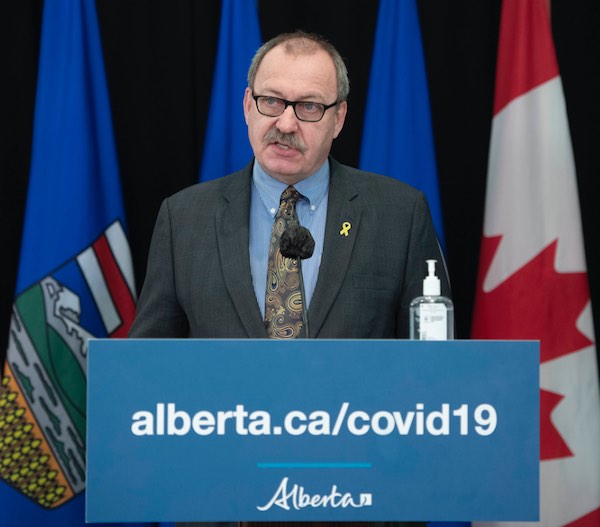Alberta
Free hotel room and food for up to 14 days for Albertans who can not isolate or quarantine at home

From the Province of Alberta
All Albertans are now eligible to receive self-isolation supports to help limit the spread of COVID-19.
Prior to this expansion, only Albertans in Edmonton and Calgary were eligible for the $625 payment when they completed self-isolating in their assigned hotel.
Now, Albertans across the province – including First Nations individuals living both on and off reserve and people living on Metis Settlements who cannot isolate safely in their own home – are eligible.
Upon referral by Alberta Health Services, Albertans who must isolate or quarantine and cannot do so safely at home are eligible for a free-of-charge hotel room stay of up to 14 days, complete with culturally appropriate food and other supports.
COVID Care Teams will continue to provide on-the-ground supports and interventions to limit the spread of the virus. Supports include care packages with masks, sanitizers and information translated in multiple languages. Safe transportation to COVID-19 assessment and testing facilities is also available.
“Today’s expansion builds on the effective outreach efforts of COVID Care Teams. No matter what they earn, what community they live in or what language they speak, all Albertans should be able to isolate safely to protect themselves, their families and their neighbours from COVID-19. Reducing the spread means we can get Alberta’s economy back on track while we protect both lives and livelihoods.”
“Expanding the isolation supports to include people on First Nations and Metis Settlements is the right thing to do. Everyone should have the chance to isolate safely while having the financial support to cover expenses while they recover.”
“Our community needs this kind of support to stop the spread of COVID. Having come from an area that has been particularly hard hit, we are grateful to the province for providing a means for our residents to access a place to isolate safely. Knowing they will be able to cover their bills when sick will make a world of difference for the Samson Cree Nation and all other Indigenous communities.”
Alberta’s government is responding to the COVID-19 pandemic by protecting lives and livelihoods with precise measures to bend the curve, sustain small businesses and protect Alberta’s health-care system.
Quick facts
- The COVID Care Team program launched in December 2020 as an integrated way to reach communities with particularly high levels of COVID-19 spread.
- The Government of Alberta also developed an outreach campaign to communicate important public health information directly to Albertans who may have English language barriers through expanded access to translated materials and other supports.
- Messages are being delivered in 10 languages through radio, television and print advertising, as well as through various social media channels and web platforms.
- Since the launch of the COVID Care Teams and outreach campaign on Dec. 15, more than 850 Albertans have accessed hotel accommodations for self-isolation purposes.
Alberta
Owner sells gas for 80 cents per litre to show Albertans how low prices ‘could’ be

Undoubtedly some of the motorists driving past The Whistle Stop Cafe at Mirror on Tuesday morning thought it was an April Fools prank. It wasn’t.
Chris Scott, owner of the gas station at The Whistle Stop Cafe offered a one day promotion on April 1st. Scott sold 8000 litres of regular gasoline for $0.80/ litre.
The promotion was funded by Scott and the Alberta Prosperity Project. In this video posted to his social media, Chris Scott explains why they did it.
Alberta
The beauty of economic corridors: Inside Alberta’s work to link products with new markets

From the Canadian Energy Centre
Q&A with Devin Dreeshen, Minister of Transport and Economic Corridors
CEC: How have recent developments impacted Alberta’s ability to expand trade routes and access new markets for energy and natural resources?
Dreeshen: With the U.S. trade dispute going on right now, it’s great to see that other provinces and the federal government are taking an interest in our east, west and northern trade routes, something that we in Alberta have been advocating for a long time.
We signed agreements with Saskatchewan and Manitoba to have an economic corridor to stretch across the prairies, as well as a recent agreement with the Northwest Territories to go north. With the leadership of Premier Danielle Smith, she’s been working on a BC, prairie and three northern territories economic corridor agreement with pretty much the entire western and northern block of Canada.
There has been a tremendous amount of work trying to get Alberta products to market and to make sure we can build big projects in Canada again.
CEC: Which infrastructure projects, whether pipeline, rail or port expansions, do you see as the most viable for improving Alberta’s global market access?
Dreeshen: We look at everything. Obviously, pipelines are the safest way to transport oil and gas, but also rail is part of the mix of getting over four million barrels per day to markets around the world.
The beauty of economic corridors is that it’s a swath of land that can have any type of utility in it, whether it be a roadway, railway, pipeline or a utility line. When you have all the environmental permits that are approved in a timely manner, and you have that designated swath of land, it politically de-risks any type of project.
CEC: A key focus of your ministry has been expanding trade corridors, including an agreement with Saskatchewan and Manitoba to explore access to Hudson’s Bay. Is there any interest from industry in developing this corridor further?
Dreeshen: There’s been lots of talk [about] Hudson Bay, a trade corridor with rail and port access. We’ve seen some improvements to go to Churchill, but also an interest in the Nelson River.
We’re starting to see more confidence in the private sector and industry wanting to build these projects. It’s great that governments can get together and work on a common goal to build things here in Canada.
CEC: What is your vision for Alberta’s future as a leader in global trade, and how do economic corridors fit into that strategy?
Dreeshen: Premier Smith has talked about C-69 being repealed by the federal government [and] the reversal of the West Coast tanker ban, which targets Alberta energy going west out of the Pacific.
There’s a lot of work that needs to be done on the federal side. Alberta has been doing a lot of the heavy lifting when it comes to economic corridors.
We’ve asked the federal government if they could develop an economic corridor agency. We want to make sure that the federal government can come to the table, work with provinces [and] work with First Nations across this country to make sure that we can see these projects being built again here in Canada.
-

 2025 Federal Election2 days ago
2025 Federal Election2 days agoChina Election Interference – Parties Received Security Briefing Days Ago as SITE Monitors Threats to Conservative Candidate Joe Tay
-

 2025 Federal Election2 days ago
2025 Federal Election2 days agoFixing Canada’s immigration system should be next government’s top priority
-

 2025 Federal Election1 day ago
2025 Federal Election1 day agoPoilievre, Conservatives receive election endorsement from large Canadian trade union
-

 Bruce Dowbiggin2 days ago
Bruce Dowbiggin2 days agoAre the Jays Signing Or Declining? Only Vladdy & Bo Know For Sure
-

 2025 Federal Election2 days ago
2025 Federal Election2 days agoLondon-Based Human Rights Group Urges RCMP to Investigate Liberal MP for Possible Counselling of Kidnapping
-

 2025 Federal Election2 days ago
2025 Federal Election2 days agoRCMP Confirms It Is ‘Looking Into’ Alleged Foreign Threat Following Liberal Candidate Paul Chiang Comments
-

 Censorship Industrial Complex2 days ago
Censorship Industrial Complex2 days agoFrance condemned for barring populist leader Marine Le Pen from 2027 election
-

 Business1 day ago
Business1 day agoBiden’s Greenhouse Gas ‘Greendoggle’ Slush Fund Is Unraveling






